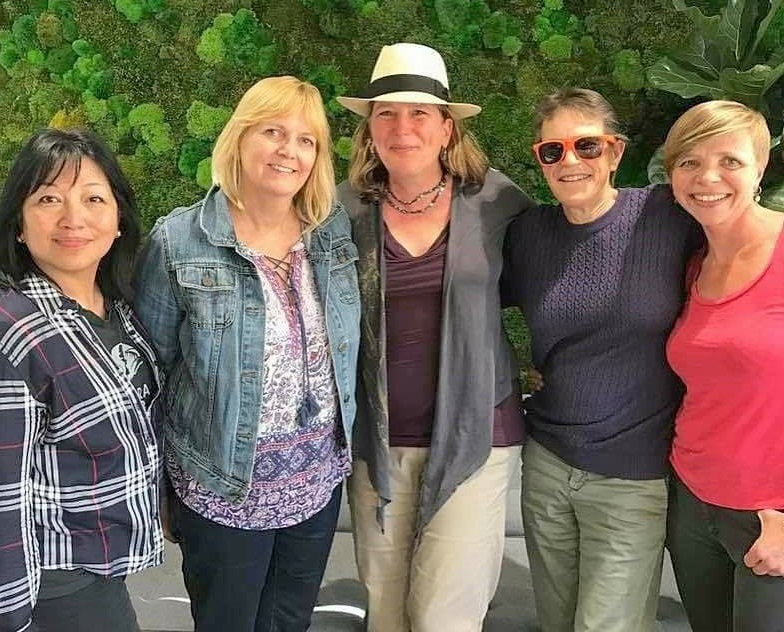From the mothers in Flint, MI, and Porter Ranch, CA, to the female leaders of the Standing Rock Sioux, women’s leadership on climate, environmental, and health issues is critical to a safe and healthy future for us all.
That’s why I was excited to hear the results of the Sierra Club Board of Directors' election of officers. For the first time in the Sierra Club’s 125-year history, an all female-identified executive committee was elected. The Sierra Club Board of Directors elected Loren Blackford as the new Board President, Susana Reyes as the new Board Vice President, Robin Mann as the new Secretary, Liz Walsh as returning Treasurer, and Margrete Strand-Rangnes as the new fifth officer.

It is fitting that on the Sierra Club’s historic 125th anniversary, an all-female executive committee was elected. When the Sierra Club was founded in 1892, it was one of the few outdoor clubs that accepted women.
The Sierra Club has come a long way in its 125 years, and this election is just one milestone of many on our road to a more inclusive community that welcomes and celebrates people from all backgrounds.
In a statement about the election, Blackford said “Together, we are committed to the principles of justice, equity, and inclusion, and we will build on the Sierra Club's 125 years of success fighting for clean air and water, renewable energy, and access to nature for all."
Today, the Club’s work has not only expanded but also continues to evolve to be more just, equitable, and inclusive. While John Muir may not have set out to curb climate disruption or limit asthma-causing pollution from coal plants, this work is critical to protecting our environment and conserving it for all. The Sierra Club works to protect the air, land, water, and climate for all -- so that everyone has the ability to enjoy the outdoors.
As Supreme Court Justice Ruth Bader Ginsburg said, “Women belong in all places where decisions are being made.” After 125 years, the Sierra Club now has an all-female executive committee and a majority-female executive team.
Sarah Hodgdon, Sierra Club’s National Program Director, noted “This is a tough time to be leading in the environmental movement. We have a lot of hard decisions before us every day, and a faster pace than ever. Women are typically socialized to be collaborative and emotionally supportive, which means that with a majority-female-identified executive team, we have a group of folks who bring a lot of those skills to the table. The powerful solidarity I feel with the other women on our team, and the support we offer each other as people and as leaders, are some of the most important factors in my success here at Sierra Club.”
This is important because the effects of climate disruption aren’t gender neutral and neither are the solutions. Women often face a greater risk of getting sick, losing their livelihoods, living in poverty, and being displaced when weather disasters strike. After Hurricane Katrina, a storm fueled by climate disruption, landed in New Orleans in 2005, 80 percent of those left behind in the Lower Ninth Ward were women.
Women’s leadership leads to stronger environmental outcomes. When more women are involved in the decision-making process, their perspectives are likely to promote improvements in energy access as well as innovative ways to combat climate change. Companies with more women on their boards are more likely to proactively invest in renewable power generation, and the number of women serving in a country’s legislature can determine whether that country reduces climate emissions.
Sierra Club Vice President Susana Reyes noted the similarities between the impacts of climate disruption and the debate over repealing the Affordable Care Act, also known as Obamacare. From committee hearings to White House meetings, the only people in the room have been men. The failure to act on climate has disastrous consequences for women, and so will Trump’s disastrous plan to reduce access to healthcare.
But the Sierra Club still has growing to do. Green 2.0’s study, The State of Diversity in Environmental Organizations, shows that most of the gains in diversity in the environmental movement have come from progress in promoting the leadership of white women. Success toward inclusion requires organizations to elevate women from all ethnic backgrounds and not only white women.
People of color in the U.S. are disproportionately harmed by environmental issues. Within the demographics of women, the effects of environmental injustice are amplified for women of color and those in the LGBTQ community. Lesbian, bisexual, transgender women, and those who identify outside of the gender spectrum face disproportionate levels of violence at the hands of both strangers and intimate partners. This is only exacerbated by climate disruption. As Nellis Kennedy-Howard noted when interviewed by the Huffington Post at the Washington, D.C., Women’s March, Native women and other women of color face elevated rates of sexual assault.
No matter one’s gender, everyone has the right to live in a safe and clean environment, free of gender-based violence and discrimination, and with access to clean air, water, and energy.
For the Sierra Club, this milestone in female leadership can serve as a stepping stone for our work on equity, inclusion and justice. We’ll keep working to transform ourselves and our organization, because everyone deserves a seat at the table.